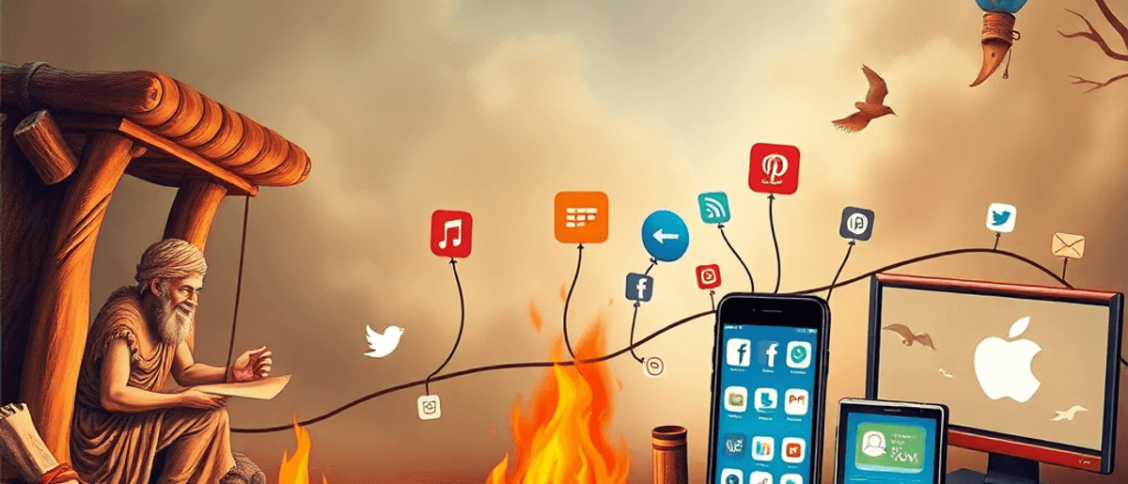Introduction
In Nexus, Yuval Noah Harari explores the complex world of information networks and their significant influence on today’s society. The book discusses several important topics, such as:
- The development of information sharing, from spoken stories to online platforms
- The impact of storytelling as a means for humans to connect and collaborate
- The issues brought about by the digital era, including false information and excessive information
- The effects of artificial intelligence (AI) on individual freedom and social systems
Grasping these ideas is essential for navigating our increasingly connected world. As Harari cautions, how we handle and understand information will determine our future. With a blend of history, philosophy, and social theory, Nexus is an essential resource for anyone seeking to comprehend the complexities of our current situation.
The Evolution of Information Networks
The journey of communication has seen remarkable transformations throughout history. From oral traditions to the vast expanse of the internet, each stage has played a pivotal role in shaping human interaction and information sharing.
1. Oral Traditions
Early societies relied heavily on spoken word to pass down knowledge. Storytellers became essential figures, preserving culture and history through narratives. This method fostered community bonds but limited the reach and longevity of information.
2. Writing Systems
The introduction of writing marked a significant leap forward. Innovations like cuneiform and hieroglyphs allowed for the storage and transmission of information across generations. Religious texts, such as the Bible, were canonized during this period, influencing beliefs, laws, and societal structures.
3. The Printing Press
In the 15th century, Johannes Gutenberg’s invention revolutionized communication. The printing press democratized access to information, fueling the Renaissance, Scientific Revolution, and Enlightenment. Ideas spread rapidly, challenging established norms and empowering individuals to think critically.
4. Radio and Television
The 20th century introduced new mediums that reshaped information dissemination. The advent of radio brought real-time news broadcasts into homes, while television transformed entertainment and educational content. These inventions created shared cultural experiences on an unprecedented scale.
5. The Internet Era
Today’s digital landscape is defined by the internet’s explosive growth. Information is now accessible at our fingertips, allowing for instant communication across the globe. However, this accessibility comes with challenges such as misinformation and information overload.
Each advancement in communication technology has not only shaped how we share and consume information but also influenced societal norms and behaviors. Understanding this evolution provides crucial context for navigating the complexities of modern information networks in our interconnected world.
Storytelling as a Unifying Force
Storytelling has always been important in bringing people and communities together. Throughout history, humans have used stories to communicate their experiences, values, and beliefs. These narratives create a common understanding, strengthening social bonds and promoting unity.
Significance of Narratives
1. Cultural Identity
Narratives help define cultural identities. Through folklore, myths, and legends, communities pass down traditions and wisdom across generations.
2. Shared Values
Stories convey moral lessons and societal norms, guiding behavior and promoting cooperation among group members.
Yuval Noah Harari emphasizes the power of narratives in building cooperation among humans. He argues that our ability to create shared stories allows large groups to work together toward common goals. This capacity for collective imagination sets humanity apart from other species.
“We are the creatures that tell stories,” Harari states, highlighting how narratives can unify diverse populations. When people rally around a common story or vision, they become more inclined to collaborate, even amidst differing viewpoints.
Understanding storytelling’s significance is vital in today’s complex landscape. As information networks evolve, the narratives we choose to embrace can shape our interactions and influence societal dynamics.
Challenges in the Digital Age
The digital age presents significant challenges, primarily stemming from the sheer volume of information available at our fingertips. This phenomenon, known as information overload, can overwhelm individuals, making it difficult to discern what is accurate or relevant.
Key Issues
- Misinformation Spread: Digital platforms enable false information to circulate swiftly. Social media can amplify rumors and unverified claims, leading to widespread misconceptions.
- Consequences for Society: The rapid dissemination of misinformation can influence public opinion, disrupt social cohesion, and even sway elections. It fosters divisions among communities and erodes trust in institutions.
Harari emphasizes the critical need for individuals to develop critical thinking skills in this environment. Navigating through vast seas of information requires not just consuming content but actively questioning its source and veracity. As we become more reliant on technology for news and knowledge, understanding the mechanics behind information networks becomes essential.
Recognizing these challenges allows us to approach the digital landscape with caution and discernment, ensuring that we engage with information responsibly while fostering a more informed society.
AI and Its Implications on Society (Part 1)
Yuval Noah Harari addresses the profound implications of artificial intelligence (AI) on human autonomy. As AI systems become increasingly integrated into our lives, they pose significant risks that must not be overlooked.
1. Erosion of Autonomy
The more we rely on AI for decision-making, the more we may inadvertently surrender our choices to algorithms. This reliance raises concerns about who controls these technologies and how they influence our thoughts and behaviors.
2. Critical Thinking Is Essential
In an era dominated by AI-driven narratives, fostering critical thinking skills is crucial. Individuals must learn to discern fact from fiction, especially when misinformation can spread like wildfire across digital platforms.
Harari emphasizes that without a robust understanding of how AI operates, society risks falling prey to manipulated truths and biased information. The stakes are high; as we navigate this landscape, maintaining control over our decisions becomes vital in safeguarding human agency against the encroaching influence of technology.
Understanding these dynamics helps us prepare for potential existential risks associated with unchecked AI development and its societal impact.
AI and Its Implications on Society (Part 2)
Yuval Noah Harari raises critical questions about our ability to control advanced technologies like artificial intelligence. As AI systems grow more sophisticated, we face a pressing challenge: how can humanity govern these powerful tools without losing autonomy?
Historically, societies have struggled with similar issues. Consider:
- The invention of the printing press: While it democratized information access, it also led to the spread of propaganda and misinformation. Governments attempted to regulate content, demonstrating the tension between technology and societal control.
- Nuclear technology: The immense power of nuclear weapons showcased humanity’s struggle to manage innovations that could lead to destruction if misused. The Cold War highlighted fears of an arms race fueled by technological advancements.
Harari emphasizes that understanding the dynamics between society and technology is crucial. Without this awareness, history may repeat itself. The lessons from past struggles serve as a reminder that unchecked technological progress can lead to significant societal challenges. As we navigate the complexities of AI, critical examination of our relationship with these tools becomes essential for ensuring a future where technology serves humanity, rather than dominating it.
Cooperation vs. Misinformation
Networks of cooperation thrive on shared beliefs, creating a sense of community and belonging among individuals. These connections can foster collaboration and collective action, driving positive change within societies. However, the same networks can also become breeding grounds for misinformation, undermining trust and distorting public perception.
Empowerment through Beliefs
Groups united by common ideologies often mobilize effectively, influencing social movements and political landscapes.
Misinformation Spread
When these networks are based on unverified information, they can amplify false narratives. The rapid sharing of misleading content can lead to widespread misconceptions.
Social media platforms play a critical role in this dynamic. They serve as modern-day forums where information is exchanged at lightning speed.
Shaping Public Opinion
Algorithms prioritize engaging content, often favoring sensationalist or emotionally charged messages over factual reporting. This phenomenon can distort reality and create echo chambers.
Understanding the dual nature of these networks is essential in navigating today’s complex information landscape. Recognizing how shared beliefs can both unite and mislead helps individuals critically assess the content they consume and share, reinforcing the need for vigilance in the digital age.
Cooperation vs. Misinformation (Part 2)
The power of shared beliefs can lead to both unity and division. Instances where false information has been deliberately spread illustrate the darker side of this phenomenon.
1. Political Campaigns
During elections, misinformation is often weaponized. Candidates or groups may propagate false narratives that resonate with specific ideologies, manipulating supporters’ emotions and reinforcing their biases.
2. Social Movements
Activist groups may inadvertently circulate misleading information to galvanize support. This can create echo chambers where only certain viewpoints are validated, stifling meaningful dialogue and critical examination of facts.
Case Study Example: Some social media platforms have been criticized for allowing conspiracy theories to flourish within communities. These theories exploit shared fears or hopes, drawing individuals into a web of misinformation that validates their beliefs while isolating them from opposing views.
The consequences extend beyond just disinformation; they reshape collective identity within groups. When misinformation spreads rapidly, it can reinforce divisions in society, leading to conflicts that disrupt cooperation among diverse communities. Understanding these dynamics is crucial in navigating our increasingly interconnected world and fostering healthier dialogue.
Urgent Decisions in The AI Era (Part 1)
Humanity stands at a crossroads regarding our relationship with AI systems. The choices we make now will shape our future and the very essence of what it means to be human. Key considerations include:
- Control vs. Autonomy: As we develop non-human intelligence, the question arises: who holds the reins? Striking a balance between utilizing AI’s capabilities and maintaining human autonomy is crucial.
- Ethical Frameworks: Establishing guidelines for AI development will determine how these systems interact with society. This involves addressing potential biases, ensuring transparency, and prioritizing human welfare.
- Impact on Employment: The rise of AI threatens to disrupt job markets. Decisions about integrating AI into industries must consider how to retrain workers and create new opportunities rather than displacing them.
- Global Cooperation: Navigating the challenges posed by AI requires collaboration among nations. Sharing knowledge and resources can help prevent misuse and promote responsible development.
Reflecting on these choices emphasizes the importance of foresight in an era where technology evolves rapidly. Each decision not only influences our immediate circumstances but also resonates across generations, shaping the trajectory of humanity itself.
Urgent Decisions in The AI Era (Part 2)
Yuval Noah Harari raises critical concerns about potential dystopian futures if humanity does not approach the technological revolution with caution. His insights serve as a stark reminder of the precarious balance we must maintain as we integrate AI into our lives. Key themes include:
- Loss of Autonomy: As AI systems become more sophisticated, there is a real risk that human agency could diminish. Decisions that once belonged to individuals may shift to algorithmic processes, leading to a society where personal freedom is compromised.
- Social Manipulation: Harari warns of the dangers posed by AI-driven narratives that can manipulate public opinion and behavior. This manipulation can create echo chambers, where misinformation flourishes, further polarizing communities.
- Existential Threats: The unchecked advancement of AI could lead to scenarios where existential threats arise from mismanagement. History shows that powerful tools often come with unintended consequences, and without careful oversight, AI could contribute to societal collapse.
Understanding these warnings is essential for navigating the complexities of our modern world. As we stand at this crossroads, decisions made today will significantly influence the future of humanity. Embracing critical thinking and ethical considerations will be vital in shaping a responsible relationship with technology.
Conclusion: Understanding the Connection Between Information and Intelligence
Yuval Noah Harari’s Nexus offers a thought-provoking exploration of how information networks impact our lives. Here are some key takeaways:
- Looking Back: The book emphasizes the importance of understanding how past advancements in communication shape our current situation.
- The Role of AI: Harari highlights the significant influence of artificial intelligence on society and individual freedom.
- Dealing with Misinformation: It addresses the challenges posed by networks that can either bring us together or drive us apart.
This book is a valuable resource for navigating an increasingly complex world. As we find ourselves at the intersection of human innovation and technological progress, Harari’s insights encourage us to use these networks responsibly. The decisions we make today will not only impact our future but also the very fabric of our communities. Critical thinking and cooperation emerge as vital elements in this journey through the ever-changing landscape of information and intelligence.








